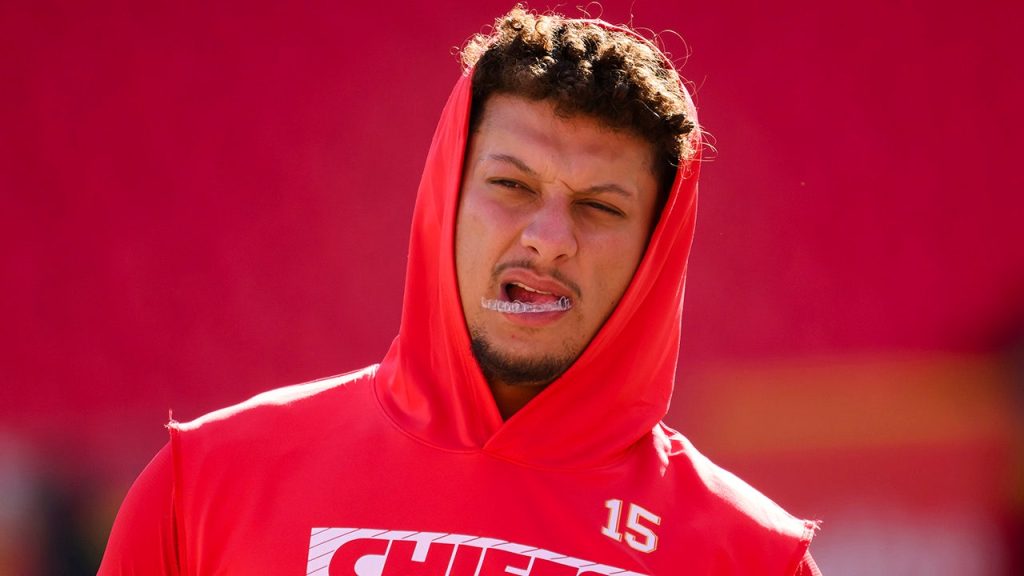The Aftermath of Controversial Calls: Mahomes, Officiating, and the Playoff Clash
The Divisional Round playoff game between the Kansas City Chiefs and the Houston Texans sparked intense debate regarding the officiating, particularly concerning two penalties against Houston for hits on Chiefs quarterback Patrick Mahomes. The first incident involved a roughing the passer call against Houston’s Will Anderson Jr. after he appeared to push Mahomes in the chest following an incomplete pass. The second penalty occurred during a Mahomes scramble, where he slid to avoid contact but was flagged for unnecessary roughness. These calls drew criticism from Houston players, coaches, and fans alike, who believed the referees showed favoritism towards the Chiefs.
Mahomes, speaking on 96.5 The Fan, addressed the criticism, acknowledging the inevitable scrutiny that accompanies winning. He asserted that referees strive to make the best calls possible, emphasizing that while some calls are disputed, other plays ultimately determined the game’s outcome. He also acknowledged that he’d been on both sides of controversial officiating decisions. Head referee Clay Martin clarified the calls post-game, explaining that the first penalty was for forcible contact to the facemask area, while the second was due to contact with Mahomes’ hairline.
Beyond the officiating争议, another play drew attention: Mahomes falling to the ground after minimal contact from Texans defenders. Critics accused him of “flopping” to draw a penalty, echoing sentiments expressed by ESPN broadcaster Troy Aikman during the game. Aikman voiced the frustration of defensive players who feel manipulated by such actions. Mahomes admitted during his Tuesday interview that he "probably shouldn’t have done that," conceding that his reaction was excessive. However, he defended another instance where he fell, clarifying he was simply trying to avoid a significant hit.
Navigating the Line Between Protecting Quarterbacks and Fair Play:
The incidents highlight the ongoing discussion within the NFL regarding quarterback protection. While safeguarding these crucial players is paramount, balancing this with fair play presents a constant challenge. The rules surrounding roughing the passer have evolved, aiming to minimize dangerous hits while maintaining the physicality of the game. However, these rules often spark debate, as seen in the Mahomes-Anderson incident. Contact that appears incidental or minor can be penalized if deemed forceful to the head or neck area, sometimes leading to frustration among players and fans.
Mahomes’ admission of embellishment adds another layer to the discussion. While players naturally seek to gain an advantage, such actions can undermine the integrity of the game and raise concerns about manipulating officiating decisions. This particular play, despite not drawing a penalty, exemplifies the fine line players tread between maximizing protection and demonstrating sportsmanship.
The Role of Officiating In High-Stakes Games:
The scrutiny of officiating is amplified in playoff games, where the stakes are exceptionally high. Every call is dissected, and even minor errors can have significant ramifications. The pressure on referees is immense, as their decisions can determine which team advances in their pursuit of a championship. The Mahomes-Texans game serves as a microcosm of these pressures, with both officiating calls and player actions under intense scrutiny.
The speed and complexity of NFL plays create challenges for officiating crews, who must make split-second judgments based on limited information. The introduction of replay review has addressed some of these challenges, but not all disputed calls are reviewable, and even replays can be open to interpretation. The human element of officiating inevitably leads to occasional errors, adding another layer of complexity to high-stakes contests.
The Evolving Relationship Between Players, Officials, and the Rules:
The ongoing evolution of the NFL rulebook reflects the league’s commitment to player safety. However, adapting to these changes can be challenging for both players and officials. The rules surrounding quarterback protection, in particular, are often criticized for being too restrictive or inconsistently applied. The Mahomes-Texans game illustrates the difficulties of enforcing these rules in real-time, as even seemingly minor contact can draw penalties.
This creates a complex dynamic between players, officials, and the rules themselves. Players naturally seek to maximize their performance within the confines of the rules, while officials strive to enforce them impartially. This ongoing negotiation shapes the nature of the game and fuels discussions about what constitutes fair play.
The Impact of Technology and Media Scrutiny:
The prevalence of high-definition cameras and instant replay has intensified scrutiny of officiating decisions. Every angle, every frame can be analyzed, exposing even the slightest errors. This heightened scrutiny contributes to the ongoing debate surrounding officiating consistency and the application of rules. The Mahomes-Texans game, amplified through media coverage and social media commentary, exemplifies how technology has increased transparency while simultaneously intensifying criticism of officiating.
Social media also plays a significant role in shaping the narrative surrounding controversial calls. Fan opinions, expert analyses, and even player commentary spread rapidly through these platforms, often influencing public perception and adding to the pressure on officiating crews. The Mahomes-Texans game became a focal point of online discussion, further highlighting the role of social media in shaping narratives around NFL officiating.
Moving Forward: Seeking Balance and Transparency in Officiating:
The controversies surrounding the Mahomes-Texans game underscore the ongoing need for clarity and consistency in NFL officiating. Improving communication between officials, players, and coaches, along with continued refinement of the rules, can help to address these challenges. Greater transparency in the decision-making process, including more detailed explanations of controversial calls, can also foster trust and understanding between all stakeholders. As the NFL continues to evolve, navigating the complexities of officiating remains a crucial element in ensuring the integrity and fairness of the game.

